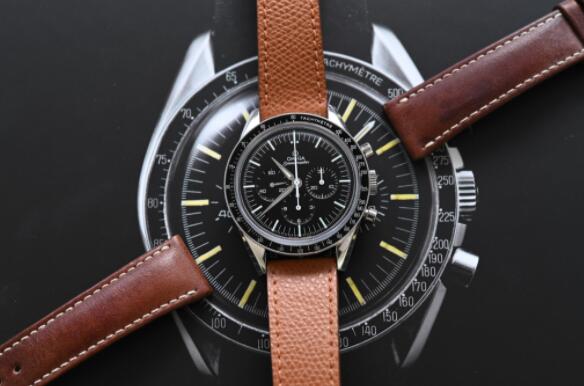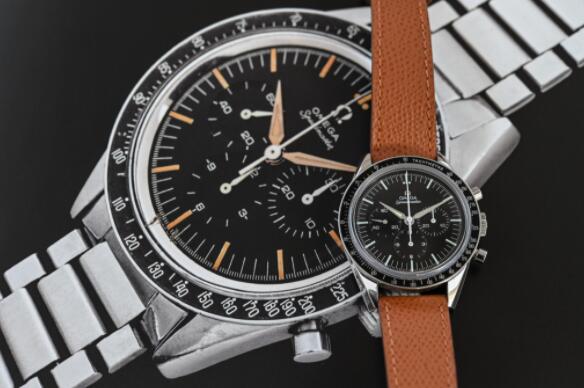Let’s take a look back at the state of the 1:1 high-quality fake Omega Speedmaster collection prior to the introduction of the First Omega in Space (also known as FOiS). As surprising as it may be, and while the Speedmaster was already a huge commercial success, with dozens of limited or commemorative editions, until 2012 the most “vintage-inspired” Speedmaster Moonwatch you could get was the 1957 Replica “Broad Arrow” watch, under the reference 3594.50 – a watch that was only an evocation of the first Speedmaster, with a classic asymmetrical “professional” case. Historic references were visible on the steel bezel, the Broad Arrow hands, the Alpha subsidiary hands, and the applied logo. A nice watch for sure, yet without being entirely faithful to the original 1957 model. And still, this watch had been produced only from 1998 to 2003. So, in early 2012, the closest you could get from a historical Speedmaster was the basic model, the Moonwatch Professional 3750.50.
Yet, perfect AAA replica Omega knew that the trend for vintage-inspired watches was growing fast and that the demand for a faithful re-edition of a historical Speedmaster was high. The brand’s answer came at Baselworld 2012, as a celebration of the 50th anniversary of the 1962 Mercury-Alpha 8 mission. Launched under the name Speedmaster “First Omega in Space,” the recipe was an unprecedented model, with a new case, a new dial, and retro styling. A simple recipe for sure, but an effective one.
What truly sets the Speedmaster First Omega in Space apart from the rest of the collection is first and foremost its case. From late 1964 to the day the FOiS was launched, the Speedmaster Moonwatch was only known in its “Professional” version, as Omega adopted the twisted lugs and the asymmetrical architecture of the case, with protected crown and pushers. However, as we’ve seen above, the Swiss made fake CK2998 model was equipped with a different case, the so-called “straight” case with symmetrical architecture. As a re-edition of this specific reference, the FOiS brought back for the first time the early straight lugs design, something that made some noise back in 2012.
The Speedmaster First Omega in Space was quite faithful to the CK2998, reproducing its measurements too. The case measured 39.7mm in diameter, the exact same dimension as used in 1962. In addition to the non-protected crown and pushers, with flat casebands, the brand also reproduced the polished bevel on top of the lugs. The case is finished with a combination of polished and brushed surfaces and, a concession to modernity, is protected by a sapphire crystal – a Hesalite would have definitely been more accurate in this vintage-inspired context…
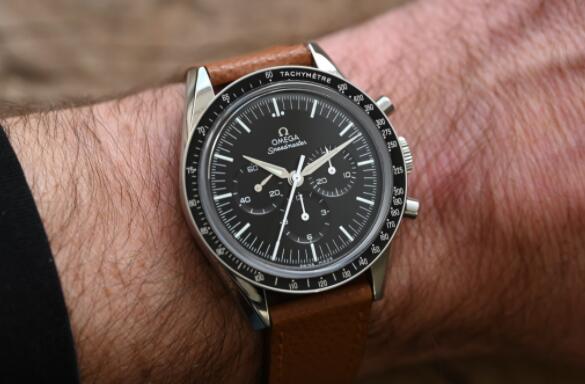
This sharper, more compact, and more angular design makes for most of the First Omega in Space’s appeal. Distinctive, fairly different from a Professional Speedmaster, faithful to the original Schirra watch, it rather drastically changes the look of the watch. The case retains however its thickness (about 14mm) and, an important thing to mention, despite the smaller diameter, the lug-to-lug dimension is about the same as a 42mm Professional model. However, this FOiS has an undeniable charm and old-school elegance that the Professional doesn’t have.
In order to stay faithful to the CK2998, Omega fitted the FOiS with a black anodized aluminium bezel with a “base 500” tachymeter scale. However, some of the details that seem today important, namely the historical “dot over 90” and “dot diagonal 70”, are not present here and the bezel simply sticks to the layout used in contemporary Moonwatch Professional. This means, in this context, a bezel with “dot beneath 70” but with vintage “tachymètre” inscription. Omega also gave this model historically-inspired pushers and crown.
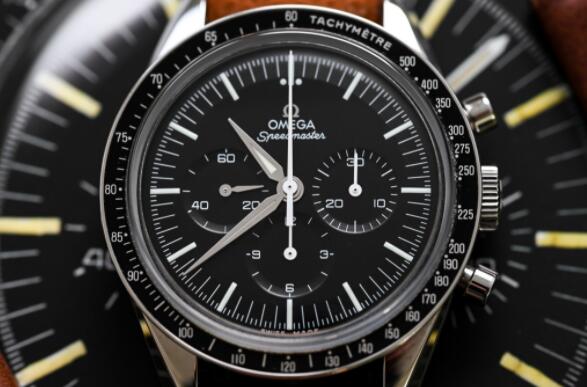
The other major update concerning the Omega Speedmaster First Omega in Space is its dial. It actually is fairly different from that of a Professional Moonwatch, yet not entirely faithful to the CK2998. Indeed, Omega retained a so-called flat dial, without the usual step found on the periphery of vintage dials. This model however comes with several distinctive features. First, the chronograph track has 3 divisions per second (instead of 5 on the Professional, which is inaccurate). Second, it comes with tall hour markers. Finally, it gets rid of the Professional mention, receives vintage-styled Omega and Speedmaster inscriptions and the Ω logo is a metallic applique, faithful to the original watch.
The other important feature, something that really sets this FOiS apart, is the set of hands. In order to bring back the flair of the CK2998, Omega gave this edition so-called “Alpha” hands, with a polished metal finish. The white, straight and non-luminous central chronograph hand is also faithful to the CK2998. The subsidiary hands are, on the other hand, more of a mystery. Certainly, the combination of a polished Alpha small seconds and white baton hands for the chronograph counters is appealing and has a vintage charm, but it doesn’t refer to any vintage reference. Indeed, CK2998 watches either featured 3 white Alpha subsidiary hands or a classic set of white batons (which was the case for Schirra’s watch). Let’s assume here a deliberate choice from Omega’s designers.
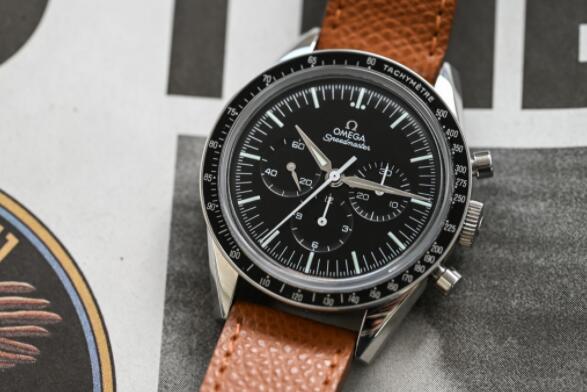
Turning the watch over and you’ll discover an unprecedented caseback. While a CK2998 features a double-step caseback with an engraved seahorse logo, the Speedmaster First Omega in Space was fitted with its own, unique caseback. It has a single step and the center is embossed with a seahorse in relief. The caseback reads “THE FIRST OMEGA IN SPACE” and “OCTOBER 3, 1962” as a reference to Wally Schirra’s flight. The mention “numbered edition” sits next to the unique number of the watch.
Inside the case, no surprises, as Omega equipped the FOiS with its loyal hand-wound chronograph movement, the rhodium-plated calibre 1861 – which is the same movement as found in contemporary Moonwatch Professional watches. This cam-operated chronograph movement features 18 jewels, beats at 21,600 vibrations/hour, and stores up to 48 hours of power reserve.
The Speedmaster First Omega in Space was only available on a leather strap – no steel bracelet option. It was fitted on a 19mm dark brown calfskin strap with off-white stitchings and a steel pin buckle. Being the personal watch of our founder Frank, it is here photographed on a strap of his choice, a grained calfskin strap in cognac with our signature light blue lining, which is available in the Online Store. The watch was delivered in a luxurious wooden box.

